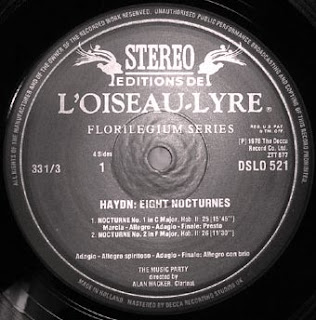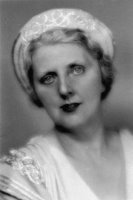Does anyone still care about the major labels?

Does anyone really still care about the "majors" anyway? Their astounding lack of imagination has hastened their own entropy. Example: the Cleveland Orchestra hasn't made a recording in nearly a decade, and when they finally get the wherewithall to do so, on DG no less, what do they announce? Beethoven's 9th. The yawns are deafening. I can't remember the last time I bought a major label recording." comments a reader on my recent post Classical music under different stewardship.
A good point, but some people do still care about the major record labels, not least the major orchestras. If you are the Los Angeles Philharmonic and you need a new music director, when the unquestionably talented Gustavo Dudamel comes knocking with a Deutsche Grammophon contract in his pocket you suddenly care. But it didn’t use to be that way, as this story tells.
Mrs Louise Hanson Dyer (photo below) was an enterprising and charismatic Australian millionairess who trained in Australia as a singer under Dame Nellie Melba before settling in France in 1927. Mrs Dyer’s lifestyle was definitely ‘A list’, and included haute couture, a
 house in Monaco, a flat on the Right Bank in Paris, and a Blue Period Picasso bought from the artist himself. She was passionate about baroque music, and committed to its promotion and preservation. To achieve this she founded Éditions de L'Oiseau-Lyre (Lyre-Bird Press) in Paris in 1932, and commissioned leading musicologists to produce accessible editions of then little-known repertoire, including Couperin, Lully and Rameau. The next logical step was to supplement the editions with authentic recordings. These were originally on 78 rpm discs, and L'Oiseau-Lyre went on to became one of the first companies to release long-playing records in France.
house in Monaco, a flat on the Right Bank in Paris, and a Blue Period Picasso bought from the artist himself. She was passionate about baroque music, and committed to its promotion and preservation. To achieve this she founded Éditions de L'Oiseau-Lyre (Lyre-Bird Press) in Paris in 1932, and commissioned leading musicologists to produce accessible editions of then little-known repertoire, including Couperin, Lully and Rameau. The next logical step was to supplement the editions with authentic recordings. These were originally on 78 rpm discs, and L'Oiseau-Lyre went on to became one of the first companies to release long-playing records in France.As the major record labels muscled in on the growing baroque market Mrs Dyer turned her energies to discovering new talent. Her extraordinary ability to identify the potential of musicians early in their careers resulted in some of the first recordings of Sir Colin Davis, Joan Sutherland, Janet Baker, the Melos Ensemble and Thurston Dart.
Louise Dyer had immense flair and style, but she was also a hard task-master. The first ever record made by the Academy of St Martin in the Fields was recorded for L'Oiseau -Lyre in the Conway Hall in London in 1961. No royalties were paid, fees were low and session time was limited. For 'A Recital by the Academy of St Martin in the Fields' the players each received £5 ($9) from Mrs Dyer in used banknotes notes from her handbag. The 40 minute programme of rarely heard works by Corelli, Torelli, Locatelli, Albicastro and Handel was recorded in just two three hour sessions, and the performing editions of the Albicastro and Handel works were prepared by the session's producer, Jimmy Burnett. Despite the pressures (or perhaps because of) this first release was rapturously received by the critics, and went on to become a best seller. It also launched the Academy of St Martin of the Fields on a career as one of the top classical recording ensembles.
When Louise Dyer died in 1962 control of L'Oiseau-Lyre passed to her second husband. The catalogue of recordings was sold to Decca in 1970, the label went on to make many fine recordings with Christopher Hogwood and others, but eventually became a baroque music sub-label in the faceless world of corporate recording. But the Éditions de L'Oiseau-Lyre publishing house continues to thrive today as a joint venture with the University of Melbourne.
The remarkable success in the 1950s and 60s of L'Oiseau-Lyre was down to Louise Dyer’s entrepreneurial flair, astute talent spotting, tight financial control, and above all passion
 for music. It was all snuffed out after Decca was bought by Universal Music, who also own Deutsche Grammophon, whose artists also include Gustavo Dudamel (left) and the Cleveland Orchestra, which is also where this overgrown path started. The thought of Gustavo Dudamel being paid in used dollar bills from a Gucci handbag round the back of Disney Hall is appealing - we can but dream.
for music. It was all snuffed out after Decca was bought by Universal Music, who also own Deutsche Grammophon, whose artists also include Gustavo Dudamel (left) and the Cleveland Orchestra, which is also where this overgrown path started. The thought of Gustavo Dudamel being paid in used dollar bills from a Gucci handbag round the back of Disney Hall is appealing - we can but dream.Now read how a surprise appointment of a conductor by another top American orchestra went pear shaped.
* With acknowledgements to 'The Academy of St Martin in the Fields' by Meirion and Susie Harries, (Michael Joseph ISBN 0718120493), to Scott Belyea whose comment on my Howell's and Lambert's Clavichord originally sparked this article, and to the Los Angeles Philharmonic for giving me a reason to upload it. Image credits: Record label from Revolutions 33, do visit this site if you are interested in LP labels, Louise Dyer from Éditions de L'Oiseau-Lyre. Any copyrighted material on these pages is used in "fair use", for the purpose of study, review or critical analysis only, and will be removed at the request of copyright owner(s). Report broken links, missing images and other errors to - overgrownpath at hotmail dot co dot uk









Comments
Thank you for your post on the history of Éditions de L'Oiseau-Lyre. What a wonderful label, with essentially two golden ages (the 2nd one with Peter Wadland, the wonderful producer that guided many recording sessions during the 1980s and early 1990s).
It's so hard to believe that L'Oiseau-Lyre is basically dead now, picked over like a turkey carcass for any recordings that can sold as reissues in the bargain basement. I'm constantly amazed at Universal's stupidity: the Mozart complete piano concerto cycle with Christopher Hogwood and Robert Levin is no longer available (and was uncompleted
just like the Haydn symphony project). Even the cover art and graphic designs were looking slipshod shortly before Universal Records completely pulled the plug on L'Oiseau-Lyre sometime after 2000.
It is my sincere wish that someone would buy back the record label
trademark, and restore this label to its former glory.
Thanks for an engaging post.
Kim Patrick Clow
http://www.livejournal.com/users/telemann